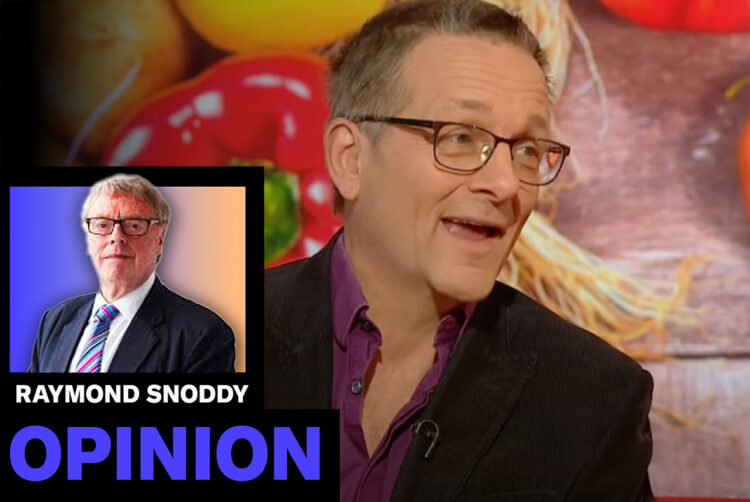Michael Mosley is testament to how the media can be a force for good

Opinion
When someone with expert knowledge is given the time and space in the media to communicate that knowledge to society as a whole, we all reap the benefits.
For the media, the disappearance of Dr Michael Mosley was a big story from the outset.
Known to millions for his television and radio programmes, his newspaper articles and a stream of books devoted to encouraging us all to aim for better health, Mosley was a benign figure in so many lives. He was so well-known as a doctor, journalist and educator that it felt as if the entire country last week was asking each other: “Have you heard Dr Mosley is missing?”
As every lead was followed, it became such a big story that it even pushed The Sun‘s main political item of the week (possibly even of the entire general election campaign), “Rishi’s Disaster D-Day”, deep inside the paper.
As for the Daily Mail, where Mosley was a columnist for many years, a story on the missing doctor was also the front-page splash, relegating the prime minister and his “D-Day blunder” to page 10.
And then came the terrible denouement.
Tributes
The combined forces of the media gave the good doctor a splendid send-off, honouring his achievements as a health educator along with a tribute from his wife of nearly 40 years and author of many of his recipes, Dr Clare Bailey.
It was the Daily Mail that gave the most fulsome tributes to Mosley, described by editor Ted Verity as “a unique, unmissable writer who was part of the Mail family”.
Not only did the paper log his trek across the mountains in “the merciless sun” and detailed how a wrong turn had ended in tragedy, but it also reprinted two examples of Mosley’s life-changing advice to readers.
One involved setting out the lessons every man should learn from his father’s diagnosis of prostate cancer; the other was what he learned when trying to reverse his own diagnosis of type 2 diabetes.
The latter led Mosley to devise the 5:2 diet — seriously cutting calories on two days a week while eating normal amounts of healthy food for the rest of the week. He managed to lose 9kg and restore his health.
“Since then, I’ve become something of a broken record on the importance of shedding body fat to improve your blood sugar levels,” wrote Mosley, whose approach was vindicated in scientific trials that demonstrated that losing as little as 2-3kg, and keeping them off, halved the risk of proceeding from pre-diabetes to the full-blown disease.
Force for good
That should be his memorial, but there is a much more important story for the media that transcends the human-interest story that ended in tragedy.
Mosley’s life should also stand as a memorial to how the media can be a force for good when someone with expert knowledge, and the ability to communicate that knowledge to society as a whole, is given the time and space to do so.
He and his GP wife virtually created an entire industry devoted to tackling unhealthy eating and living, but they have only been effective because of the media.
In 39 episodes of Trust Me, I’m a Doctor on BBC Two, Mosley led a team of young, approachable doctors, taking the latest science and exposing medical myths to the general populace.
For Channel 4, there was the 21-day body-turnaround series, while Channel 5 is still deciding what to do about his final piece of work, a three-part series on the human body.
BBC Radio 4 had only just completed his Just One Thing that everyone could do to improve their health and general wellbeing. The “one thing” ranged from spending time walking backwards to the proven therapeutic benefits of carrying out small acts of selfless kindness.
Turning lives around
Then there were the books, including recipe books.
On a personal note, Mosley-inspired recipes are currently aiding me in weight reduction.
Perhaps the most dramatic example of how Mosley and his insights could turn lives around came from Lord Watson, the former deputy leader of the Labour Party. Watson weighed 22 stones and was diabetic. Using the Mosley method, he shed seven stones, or 44kg, and no longer has to take medicine for diabetes.
But, rather surprisingly, the last word should probably go to another Mail columnist, Nadine Dorries, who was a nurse before she blundered into the Department for Culture, Media & Sport.
Writing on Monday, Dorries said that even in death “the wonderful Michael Mosley has taught us all one last valuable lesson”.
That inadvertent and tragic lesson is that, before charging off on solo walks in hot sunshine, people should make sure they have a fully charged mobile phone, plenty of water, enough money to get home and check in with companions regularly.
For those embarking on lone holiday adventures in the future, Dorries wrote: “I am sure that many will now remember Michael Mosley and realise that we are all only human — and we all have human frailties.”
 Raymond Snoddy is a media consultant, national newspaper columnist and former presenter of NewsWatch on BBC News. He writes for The Media Leader on Wednesdays — read his column here.
Raymond Snoddy is a media consultant, national newspaper columnist and former presenter of NewsWatch on BBC News. He writes for The Media Leader on Wednesdays — read his column here.



